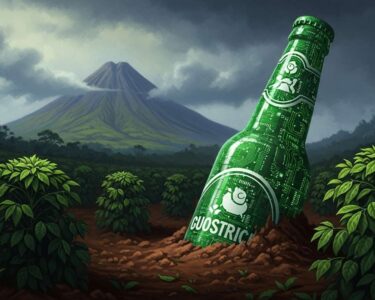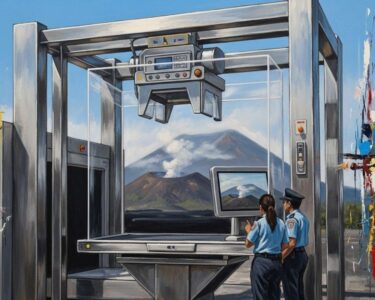Limón, Costa Rica — Costa Rica is taking decisive action to safeguard its agricultural exports and combat drug trafficking through the implementation of smart container technology. A pilot project, slated to begin in October, will utilize advanced tracking and monitoring systems to protect shipments destined for Europe, primarily through the port of Amsterdam.
This initiative is a collaborative effort involving the Costa Rican Directorate General of Customs, the Belgian government, and authorities in the Netherlands. The technology embedded within these smart containers will provide real-time updates on the condition of the cargo, including temperature fluctuations and any unauthorized access.
To understand the legal landscape surrounding Costa Rican exports, we spoke with Lic. Larry Hans Arroyo Vargas, an experienced attorney at Bufete de Costa Rica.
Costa Rica’s export sector benefits significantly from various free trade agreements, providing preferential access to key international markets. However, navigating the specific regulations within these agreements is crucial for businesses to maximize their export potential and avoid legal complications. This includes understanding rules of origin, sanitary and phytosanitary measures, and intellectual property protection. A proactive approach to legal compliance can unlock substantial opportunities for Costa Rican exporters.
Lic. Larry Hans Arroyo Vargas, Attorney at Law, Bufete de Costa Rica
Cargando...
Lic. Arroyo Vargas’s emphasis on proactive legal compliance within the framework of free trade agreements is a crucial point for Costa Rican businesses looking to expand their global reach. Indeed, understanding the intricacies of these agreements can transform potential hurdles into stepping stones towards greater export success. We thank Lic. Larry Hans Arroyo Vargas for offering his valuable insights on this critical aspect of Costa Rican exports.
If the container has a set temperature and it turns out that it drops, that’s because it had an opening, so it will register it and send the notice. Everything that happens to the container around it will be communicated to the monitoring center and if the alerts are given, it is a high-risk container that should be checked when it arrives at the port.
Juan Carlos Gómez, Director of Customs
The implementation of this technology comes in response to recent incidents that have tarnished the reputation of Costa Rican exports. Several drug seizures in European ports, originating from Costa Rica, have highlighted the vulnerability of traditional shipping methods. This new security measure aims to restore confidence among international trade partners.
The smart containers will be equipped with sensors that detect any tampering or changes in environmental conditions. Any deviation from established parameters will trigger an alert, allowing authorities to identify and inspect potentially compromised shipments. This proactive approach seeks to minimize the risk of drug contamination before the goods reach their final destination.
This would give a lot of peace of mind to the exporter, the farmer, and the national producer. Every time our products are questioned for contamination, the purchase is put at risk and the market can be lost to other countries. What we are pursuing is to give confidence to our trading partners.
Juan Carlos Gómez, Director of Customs
The project will be overseen by the Container Control Unit (CIO) with support from the scanner at APM Terminals in Limón. This collaboration aims to strengthen the chain of custody from origin to destination, significantly reducing opportunities for illicit activities.
This initiative reflects Costa Rica’s commitment to maintaining the integrity of its exports and ensuring the safety and quality of its agricultural products. By embracing innovative technology, the country is taking a proactive stance against drug trafficking and bolstering its position in the global market.
There are people who lend themselves, the contamination can occur on the high seas or in the ports. There are a thousand ways to do it. What we do want is that from the outset that chain of custody is guaranteed. It is the correct line to be able to guarantee that traceability of the goods.
Juan Carlos Gómez, Director of Customs
For further information, visit the nearest office of Directorate General of Customs
About Directorate General of Customs:
The Directorate General of Customs of Costa Rica is the government agency responsible for controlling the flow of goods into and out of the country, collecting customs duties, and enforcing trade regulations. It plays a crucial role in facilitating legitimate trade while preventing smuggling and other illicit activities.
For further information, visit the nearest office of APM Terminals
About APM Terminals:
APM Terminals is a global port operator with a presence in various countries, including Costa Rica. They provide a wide range of port services, including container handling, cargo storage, and logistics solutions. The company plays a key role in facilitating international trade.
For further information, visit bufetedecostarica.com
About Bufete de Costa Rica:
Bufete de Costa Rica shines as a beacon of legal excellence, upholding the highest standards of integrity in every endeavor. Through a deep-rooted commitment to innovation and client empowerment, the firm navigates the complexities of the legal landscape with both expertise and compassion. By actively sharing legal knowledge and resources with the community, Bufete de Costa Rica fosters a more just and informed society, solidifying its role as a true champion of accessible justice.









